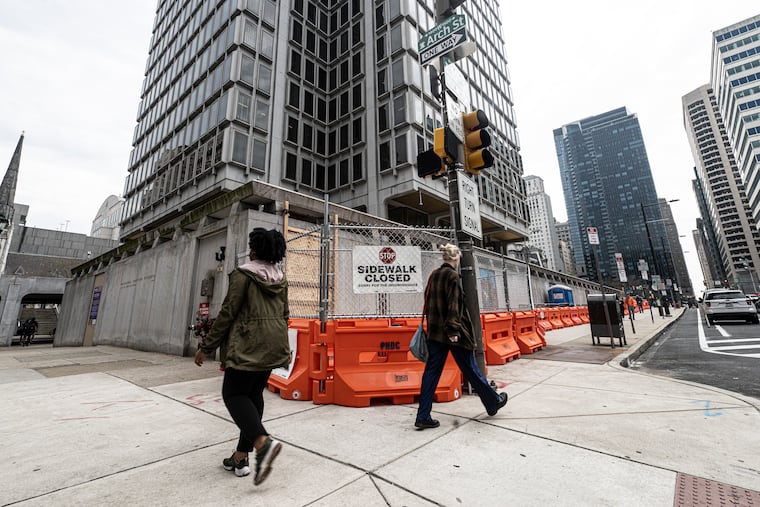Philadelphia is installing its first ‘Portland Loo’ restroom in Center City
The first Portland Loo has arrived in Philadelphia.

After a long wait, Philadelphia may soon begin installing its first modular public restroom in Center City.
The first of six Portland Loos arrived in Philadelphia this week after a manufacturing delay, said city spokesperson Sarah Peterson. The city-managed modular toilet will go up at 15th and Arch Streets, a pedestrian-dense area where temporary porta potties have been installed since 2021. Construction barriers are up at the site, but officials did not have a timeline on installation or when the bathroom would be ready for public use.
“Since this is the first Loo that will be installed, we want to provide flexibility in the construction process to ensure it is functioning properly,” Peterson said.
Manufactured in collaboration with the Portland government over a decade ago, the Portland Loo has come into hot demand among cities looking to fix their long-ignored lack of public bathroom access.
The Oregon city bills the prefabricated, kiosk-like units as the solution to “problems that are commonly experienced with public toilets,” with a graffiti-proof open-grating design and easy-to-clean metal parts. Nearly two dozen cities in the United States and Canada have installed them, amid long manufacturing delays.
They also come at a fraction of the cost of traditional bathrooms. Peterson said the city has budgeted $656,864 annually to install and maintain six modular restrooms as part of the city’s pilot program, which aims to address a persistent lack of public hygiene options.
Like most U.S. cities, Philadelphia is a public bathroom desert.
Even in densely populated areas, finding a free bathroom can feel like a cruel joke of a scavenger hunt. Government facilities like City Hall do provide some public facilities, but they’re often limited to office hours and some come with security restrictions.
Neighborhoods fare much worse. Some critics say the lack of facilities contributed to the public health crisis that was the hepatitis A outbreak in Kensington in 2019.
And, as in other cities, local officials have long relied on private businesses to provide one of the most basic human amenities. So much so that local knowledge in Philly often includes knowing restaurants and retailers that have toilets that are easily accessible without making a purchase. A local coder even made an app to help residents crowdsource places to easily relieve themselves on the go.
When Barnes & Noble recently closed its capacious Walnut Street location, residents lamented the loss of one of the most accessible bathrooms in the Rittenhouse Square area. The bookstore’s new branch will not include restrooms for customers, company representatives told The Inquirer.
Officials told online news site Billy Penn this week that the second Portland Loo is slated to open in West Philadelphia’s Clark Park later this year, with other neighborhoods to follow. The porta potties at 15th and Arch will remain open to the public next to the Municipal Services Building until the Loo is finished.